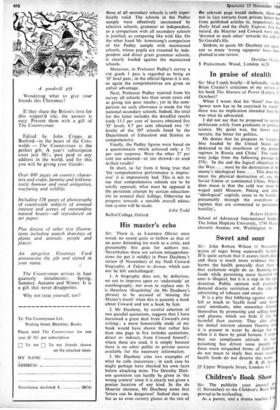His master's echo
Sir: There is, as Laurence Olivier once noted, no sound quite so hollow as that of an actor defending his work to a critic, and presumably this goes for authors too. Nevertheless there are certain misapprehen- sions (to put it mildly) in Peter Daubeny's review (8 November) of my Noel Coward biography, A Talent to Amuse, which can- not be left unchallenged: I. A biography does not, by definition, set out to improve upon or 'understudy' an autobiography, nor even to replace one. It is therefore 'disquieting' (in Mr Daubeny's phrase) to be accused of 'missing the Master's touch' when this is patently a book about Coward and not a book by him.
2. Mr Daubeny, by careful selection of two parallel quotations, suggests that I have borrowed a great deal from Coward's own writing ; a more honourable study of my book would have shown that rather less than one page in five includes quotations, direct or indirect, from Coward himself ; where these are used, it is simply because there is no other public or private source available for the necessary information.
3. Mr Daubeny cites two examples of what he calls inaccuracy ; in each case he might perhaps have checked his own facts before attacking mine. The Dorothy Dick- son quotation can hardly be given in 'the wrong context' since it is clearly not given a precise location of any kind. In the du Maurier instance, Mr Daubeny notes that 'letters can be dangerous'. Indeed they can, but as an even cursory glance at the rest of the relevant page would indicate, these are not in fact extracts from private letters but from published articles in, respectively, the Daily Mail and the Daily Express. For the record, du Maurier and Coward were only 'devoted to each other' towards the end of Sir Gerald's life.
Seldom, to quote Mr Daubeny yet again. can so many 'wrong signposts' have been planted in one review.
Sheridan Morley 5 Peckarmans Wood, London sE26






































 Previous page
Previous page